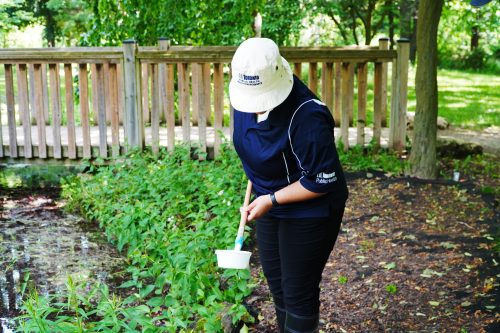
Reducing mosquito populations that can transmit West Nile virus (WNV) is an important component of the WNV program. Larviciding of City of Toronto catch basins and stagnant water sites where immature mosquitos (larvae) have been identified reduces the risk of WNV.
Larvicide is applied by licensed applicators and/or trained technicians that are approved by the Ontario Ministry of the Environment and under the authority of Toronto’s Medical Officer of Health.
 The City of Toronto applies larvicide to catch basins that hold water and breed mosquitos from June to the end of August, however the exact start date will vary, depending on larvae mosquito surveillance results. The City also monitors stagnant water sites or artificial bodies of water such as storm water ponds to determine if treatment is necessary.
The City of Toronto applies larvicide to catch basins that hold water and breed mosquitos from June to the end of August, however the exact start date will vary, depending on larvae mosquito surveillance results. The City also monitors stagnant water sites or artificial bodies of water such as storm water ponds to determine if treatment is necessary.
The City of Toronto will be using three different larvicides: methoprene, BS (Bacillus sphaericus) and Bti (Bacillus thuringiensis israelensis). Methorprene and BS will be used to treat catch basins. Bti will be used in other areas to reduce mosquito breeding.
Toronto’s mosquito control program aims at reducing the Culex mosquito population.
Culex mosquitos are the most common carrier of West Nile virus (WNV) in our region and although they prefer to bite birds, they will also bite humans.
Surveillance activities in Toronto and elsewhere in North America have identified storm water catch basins as significant breeding sites for Culex mosquitos, including some surface bodies of water.
Start Date: June 6, 2025
End Date: July 8, 2025
Start Date: July 9, 2025
End Date: August 14, 2025 (Tentative)
To be determined if required.